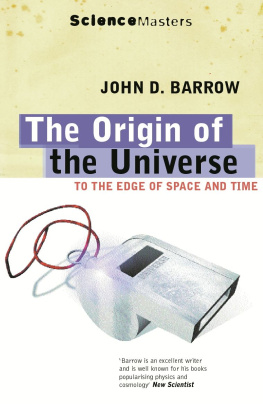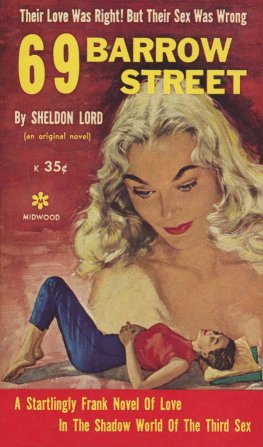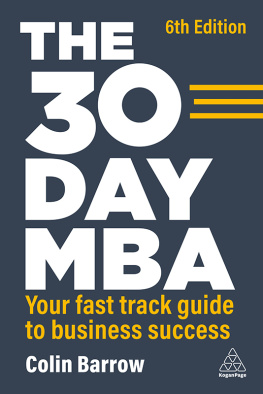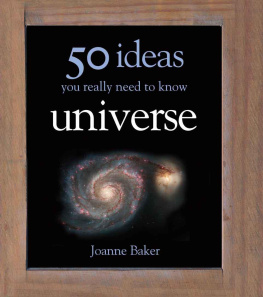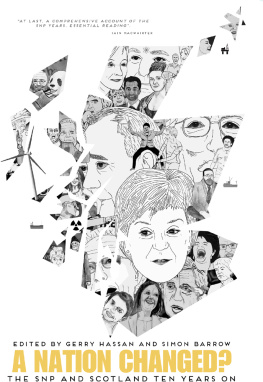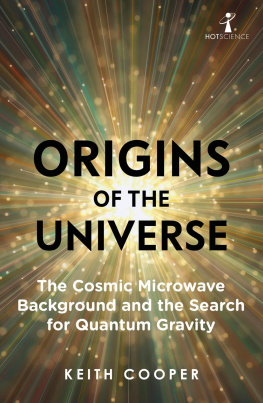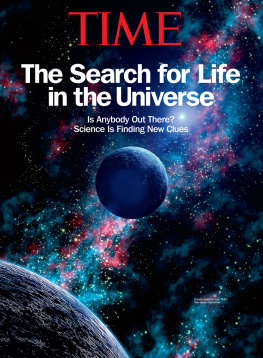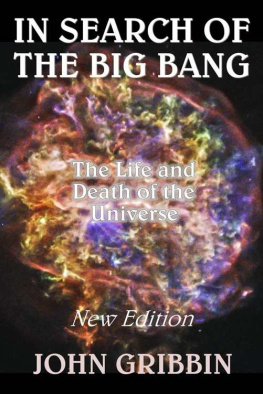John D. Barrow - The Book of Nothing: Vacuums, Voids, and the Latest Ideas about the Origins of the Universe
Here you can read online John D. Barrow - The Book of Nothing: Vacuums, Voids, and the Latest Ideas about the Origins of the Universe full text of the book (entire story) in english for free. Download pdf and epub, get meaning, cover and reviews about this ebook. year: 2002, publisher: Vintage Books, genre: Science fiction. Description of the work, (preface) as well as reviews are available. Best literature library LitArk.com created for fans of good reading and offers a wide selection of genres:
Romance novel
Science fiction
Adventure
Detective
Science
History
Home and family
Prose
Art
Politics
Computer
Non-fiction
Religion
Business
Children
Humor
Choose a favorite category and find really read worthwhile books. Enjoy immersion in the world of imagination, feel the emotions of the characters or learn something new for yourself, make an fascinating discovery.

- Book:The Book of Nothing: Vacuums, Voids, and the Latest Ideas about the Origins of the Universe
- Author:
- Publisher:Vintage Books
- Genre:
- Year:2002
- Rating:5 / 5
- Favourites:Add to favourites
- Your mark:
- 100
- 1
- 2
- 3
- 4
- 5
The Book of Nothing: Vacuums, Voids, and the Latest Ideas about the Origins of the Universe: summary, description and annotation
We offer to read an annotation, description, summary or preface (depends on what the author of the book "The Book of Nothing: Vacuums, Voids, and the Latest Ideas about the Origins of the Universe" wrote himself). If you haven't found the necessary information about the book — write in the comments, we will try to find it.
The Book of Nothing: Vacuums, Voids, and the Latest Ideas about the Origins of the Universe — read online for free the complete book (whole text) full work
Below is the text of the book, divided by pages. System saving the place of the last page read, allows you to conveniently read the book "The Book of Nothing: Vacuums, Voids, and the Latest Ideas about the Origins of the Universe" online for free, without having to search again every time where you left off. Put a bookmark, and you can go to the page where you finished reading at any time.
Font size:
Interval:
Bookmark:
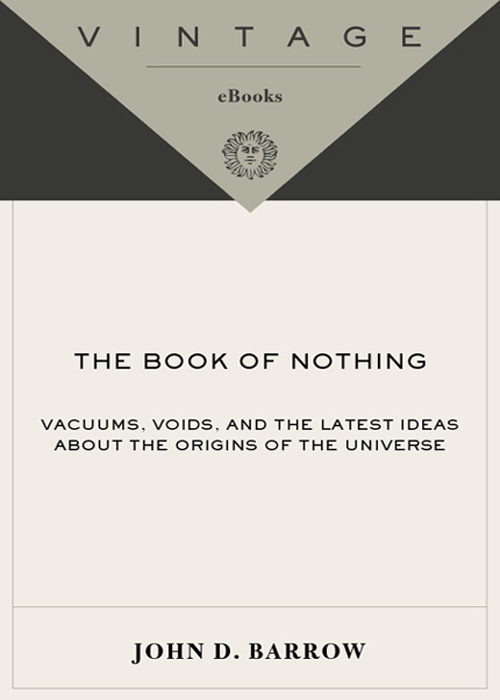
Acclaim for John D. Barrow s
The Book of Nothing
Barrow is possessed of a polymathic mind that swoops and soars as it plays in the fields of nothingness. [He] pours this vintage wine out of a Klein bottle of imagination and whimsy, which makes the readers effort worthwhile.
The Washington Post
Even when the science gets really difficult, Barrow explains it with great clarity, a lovely lightness of touch and enormous erudition. He has written an eligible bachelor of a bookwitty, suave, rich and immensely learned.
The Spectator
Barrow writes with liveliness and in a clear-headed, imaginative way. He is, as clearly proven by his clever and adept references to mathematicians, experimenters, writers, poets, and dreamers throughout the ages of the study of nothingness, a master of his art.
The Decatur Daily
Barrow is very much at home with his topic, from his splendid title onward. Readers of popular science are well served by Barrows apparently effortless range of reference.
The Guardian
Barrow explores, with meticulous scholarly attention to detail, thousands of years of philosophy, mathematics, physics and theology organized around the concept of Nothingness.
American Scientist
A clear, well-organized narrative. Nothing informs infinite aspects of life and the world at large, and Barrow does an excellent job of bringing its effects to light.
Publishers Weekly
Theres no hotter topic in science than nothing. And theres no better writer to introduce it than Professor Barrow.
Focus
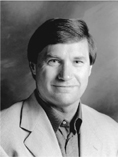
J O H N D. B A R R O W
The Book of Nothing
John D. Barrow is research professor of mathematical sciences in the Department of Applied Mathematics and Theoretical Physics at Cambridge University. His previous books include Theories of Everything, The Artful Universe, Impossibility, Between Inner Space and Outer Space, The Universe That Discovered Itself, and The Origin of the Universe. He lives in England.
Also by John D. Barrow
Theories of Everything
The Left Hand of Creation (with Joseph Silk)
The Anthropic Cosmological Principle (with Frank J. Tipler)
The World Within the World
The Artful Universe
Pi in the Sky
Impossibility
The Origin of the Universe
Between Inner Space and Outer Space
The Universe That Discovered Itself
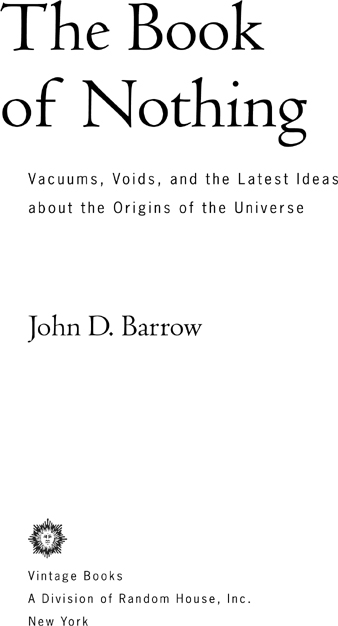
In Memory of Dennis Sciama
From time to time young men have brought me, for my advice, pieces of work, pretty well completed but with no title. This amazes me, for to me the title is the compass-setting by which the whole development is steered. Of course, I may change it on second thoughts, but then whatever emerges in the end is schizophrenic one cannot serve two masters.
John L. Synge
Talking About Relativity
Deciding on a books beginning is as complex as determining the origins of the universe.
Robert McCrum
Because its not there might be reason enough to write a book about Nothing, especially if the author has already written one about Everything. But, fortunately, there are better reasons than that. If one looks at the special problems that were the mainsprings of progress along the oldest and most persistent lines of human inquiry, then one finds Nothing, suitably disguised as something, never far from the centre of things.
Nothing, in its various guises, has been a subject of enduring fascination for millennia. Philosophers struggled to grasp it, while mystics dreamed they could imagine it; scientists strove to create it; astronomers searched in vain to locate it; logicians were repelled by it, yet theologians yearned to conjure everything from it; and mathematicians succeeded. Meanwhile, writers and jesters were happy to stir up as much ado about Nothing as ever they possibly could. Along all these pathways to the truth Nothing has emerged as an unexpectedly pivotal something, upon which so many of our central questions are delicately poised.
Here, we are going to draw together some of the ways in which our conceptions of Nothing influenced the growth of knowledge. We will see how the ancient Western addiction to logic and analytic philosophy prevented progress towards a fruitful picture of Nothing as something that could be part of an explanation for the things that are seen. By contrast, Eastern philosophies provided habits of thought in which the idea of Nothing-as-something was simple to grasp and not only negative in its ramifications. From this first simple step, there followed a giant leap for mankind: the development of universal counting systems that could evolve onwards and upwards to the esoteric realms of modern mathematics.
In science, we will see something of the quest to make a real vacuum, in the midst of a thousand years of tortuous argument about its possibility, desirability and place. These ideas shaped the future direction of many parts of physics and engineering while, at the same time, realigning the philosophical and theological debates about the possibility and desirability of the vacuum the physical Nothing. For the theologians, these debates were, in part, the continuation of a crucial argument about the need for the Universe to have been created out of both a physical and a spiritual Nothing. But for the critical philosophers, they were merely particular examples of ill-posed questions about the ultimate nature of things that were gradually falling into disrepute.
At first, such questions about the meaning of Nothing seemed hard, then they appeared unanswerable, and then they appeared meaningless: questions about Nothing werent questions about anything. Yet, for the scientists, producing a vacuum appeared to be a physical possibility. You could experiment with the vacuum and use it to make machines: an acid test of its reality. Soon this vacuum seemed unacceptable. A picture emerged of a Universe filled with a ubiquitous ethereal fluid. There was no empty space. Everything moved through it; everything felt it. It was the sea in which all things swam, ensuring that no nook or cranny of the Universe could ever be empty.
This spooky ether was persistent. It took an Einstein to remove it from the Universe. But what remained when everything that could be removed was removed was more than he expected. The combined insights of relativity and the quantum have opened up striking new possibilities that have presented us with the greatest unsolved problems of modern astronomy. Gradually, over the last twenty years, the vacuum has turned out to be more unusual, more fluid, less empty, and less intangible than even Einstein could have imagined. Its presence is felt on the very smallest and largest dimensions over which the forces of Nature act. Only when the vacuums subtle quantum influence was discovered could we see how the diverse forces of Nature might unite in the seething microworld inhabited by the most elementary parts of matter.
The astronomical world is no less subservient to the properties of the vacuum. Modern cosmology has built its central picture of the Universes past, present and future on the vacuums extraordinary properties. Only time will tell whether this construction is built on shifting sand. But we may not have to wait very long. A series of remarkable astronomical observations now seem to be revealing the cosmic vacuum by its effects on the expansion of the Universe. We look to other experiments to tell us whether, as we suspect, the vacuum performed some energetic gymnastics nearly fifteen billion years ago, setting the Universe upon the special course that led it to be what it is today and what it will eventually become.
Font size:
Interval:
Bookmark:
Similar books «The Book of Nothing: Vacuums, Voids, and the Latest Ideas about the Origins of the Universe»
Look at similar books to The Book of Nothing: Vacuums, Voids, and the Latest Ideas about the Origins of the Universe. We have selected literature similar in name and meaning in the hope of providing readers with more options to find new, interesting, not yet read works.
Discussion, reviews of the book The Book of Nothing: Vacuums, Voids, and the Latest Ideas about the Origins of the Universe and just readers' own opinions. Leave your comments, write what you think about the work, its meaning or the main characters. Specify what exactly you liked and what you didn't like, and why you think so.


